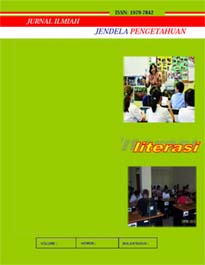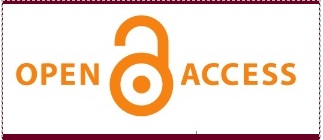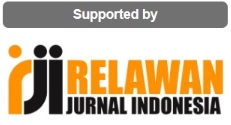Analysis of Pedagogical Content Knowledge (PCK) Levels of Teachers at SMP Negeri 21 Ambon
Analisis Tingkat Pedagogical Content Knowledge (Pck) Guru SMP Negeri 21 Ambon
Abstract
A teacher can be said to be professional and not only can master the material and concepts but must master how to teach and how learning strategies can be conveyed to students properly. These two things are between material (content) and how to teach (pedagogy), which are mutually sustainable and cannot be separated. The importance of continuity between material and pedagogics emerges, and a new understanding of how to combine material knowledge and convey it to students, namely pedagogical content knowledge (PCK), appears. The essential components of PCK are Pedagogical Knowledge (PK) and Content Knowledge (CK). This type of research is descriptive research. Descriptive research. Quantitative analysis through categorization. This study uses quantitative research as the process of data collection and processing. Quantitative research is research that uses a lot of numbers, from collecting data and interpreting data to presenting results. Based on the calculation of the PCK level at SMP Negeri 21 Ambon through the teacher's PCK test consisting of 52 open-ended questions, it is known that the ideal means is 26, and the perfect standard deviation is 7.78. Furthermore, it was found that 3 teachers were in the high PCK category, 2 teachers were in the medium PCK category, and 1 teacher was in the low PCK category.
Downloads
References
Abbitt, J. T. 2011. Measuring Technological Pedagogical Content Knowledge in Preservice Teacher Education: A Review of Current Methods and Instruments. Journal of Research on Technology in Education, 43 (4): 281-300.
Agustina, P. (2015). Pengembangan PCK (pedagogical content knowledge) mahasiswa calon guru biologi FKIP universitas muhammadiyah surakarta melalui simulasi pembelajaran. Jurnal Penelitian Dan Pembelajaran IPA, 1(1), 1–15.
Anggito, A., & Setiawan, J. (2018). Metodologi penelitian kualitatif. CV Jejak (Jejak Publisher).
Anwar, Y., Rustaman, N. Y., Widodo, A., & Redjeki, S. (2014). Kemampuan pedagogical content knowledge guru biologi yang berpengalaman dan yang belum berpengalaman. Jurnal Pengajaran MIPA, 19(1), 69–73.
Lasaiba, M. A. (2013). Kajian Keruangan Penggunaan Lahan Dalam Pengembangan Kota Ambon Berbasis Ekologi. Jurnal Pendidikan Geografi UNESA, 11(21), 34–56.
Lasaiba, M. A. (2016). Dimensi Spasial Karakteristik Sebaran Dan Deviasi Pola Pegunungan Lahan Terhadap Ekosistem Pesisir Di Kota Ambon. Jendela Pengetahuan, 9(1), 24–34.
Lasaiba, M. A. (2018). Penggunaan Model Pembelajaran Berbasis Masalah (Problem Based Learning) Terhadap Hasil Belajar Geografi Pada Peserta Didik Kelas Vii-2 Smp Negeri 14 Ambon. Jendela Pengetahuan, 11(2), 8–21. https://ojs3.unpatti.ac.id/index.php/jp/article/view/6317
Nurdyansyah, N., & Fahyuni, E. F. (2016). Inovasi model pembelajaran sesuai kurikulum 2013. Nizamia Learning Center.
Padila, T. M., Anwar, Y., & Madang, K. (2017). Analisis kemampuan Pedagogical Content Knowledge (PCK) mahasiswa calon guru biologi FKIP Unsri sebelum dan setelah praktik mengajar. Seminar Nasional Pendidikan IPA Tahun 2021, 1(1), 571–581.
Purwoko, R. Y. (2017). Urgensi Pedagogicalcontent Knowledge Dalam Meningkatkan Kualitas Pembelajaran Matematika. Jurnal Pendidikan Surya Edukasi (JPSE), 3(2), 42–55.
Rudini, R. (2016). Peranan statistika dalam penelitian sosial kuantitatif. Jurnal Saintekom, 6(2), 53–66.
Supriadi, D. (2018). Implementasi Manajemen Inovasi dan Kreatifitas Guru dalam Meningkatkan Mutu Pembelajaran. Indonesian Journal of Education Management & Administration Review, 1(2), 125–132.
Unaida, R., & Fakhrah, F. (2022). Evaluasi Kemampuan Tpack (Technologycal, Pedagogical, And Content Knowledge) Guru Biologi Sma/Ma Kecamatan Dewantara. Prosiding Seminar Nasional Biotik, 9(2), 77–83.
Yufridawati, Y., Irmawati, A., Rahmadi, U. T., & Sulistyo, F. D. (2020). Sistem zonasi di Indonesia: dalam pengelolaan dan penyelenggaraan pendidikan. Pusat Penelitian Kebijakan.
















